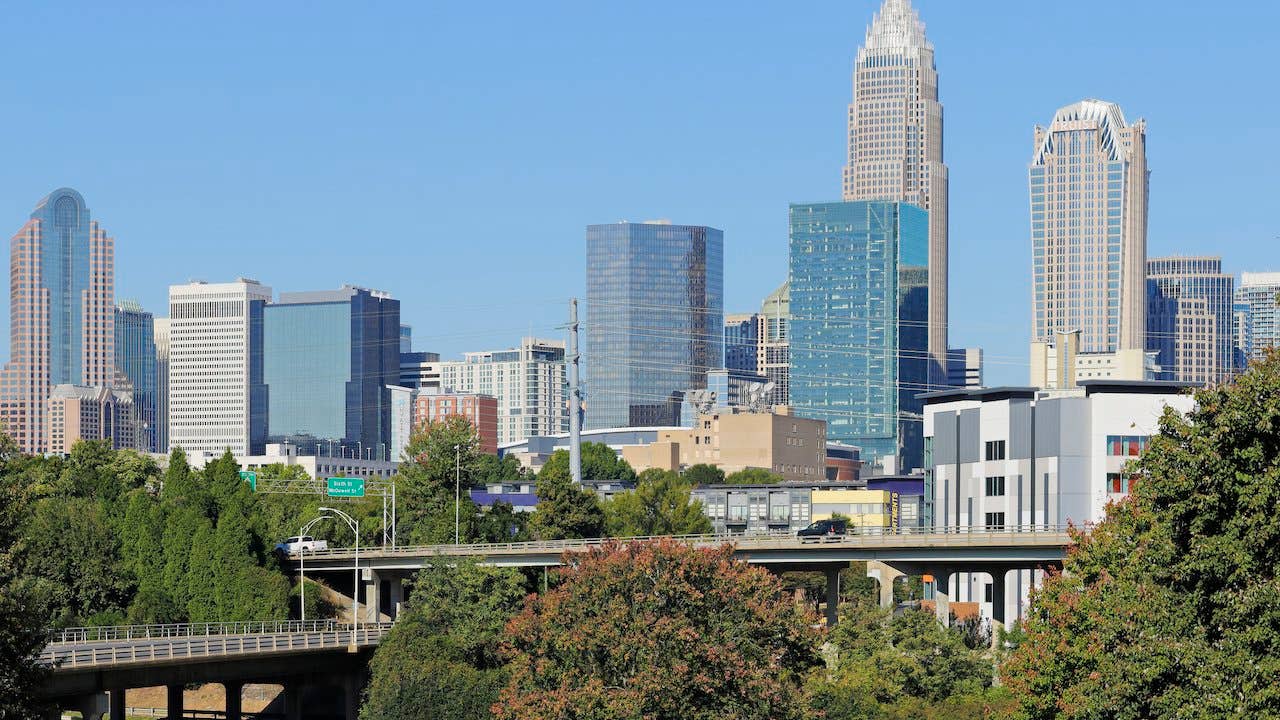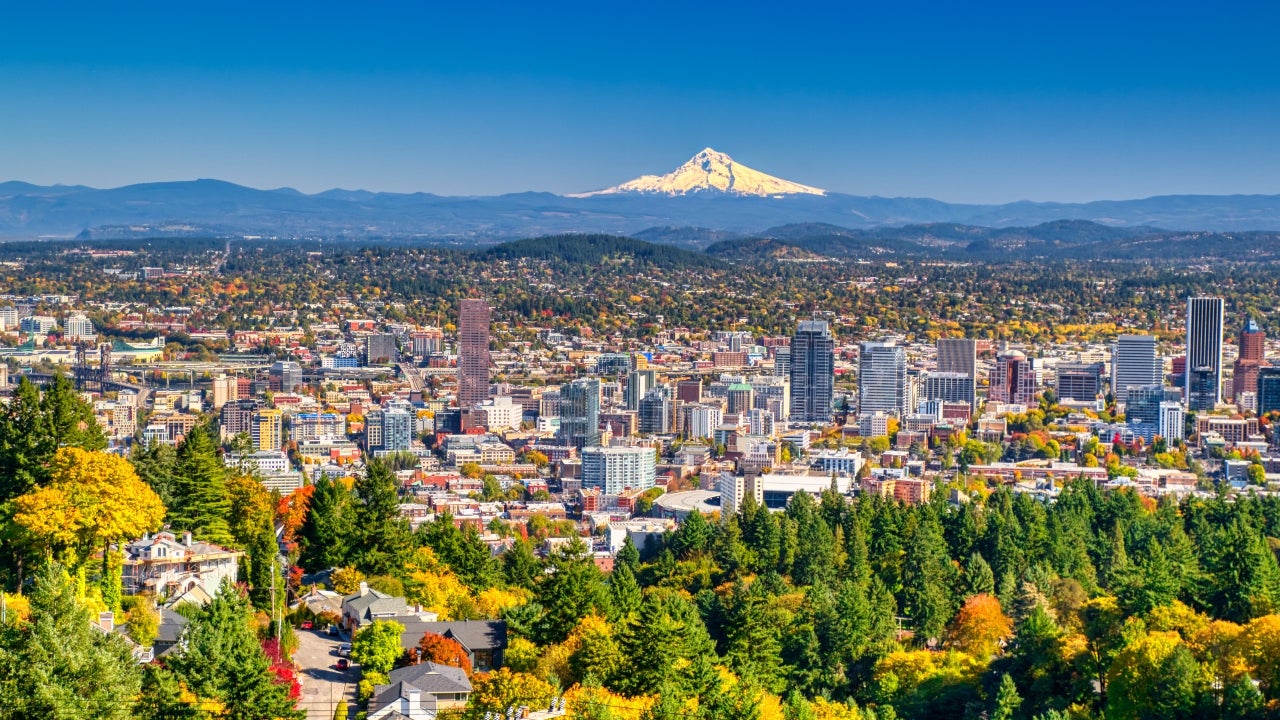Buying a house in North Carolina: A how-to

If you’re thinking about buying a home in North Carolina, kudos on picking a good location. Whether you’re hoping for big-city buzz in Charlotte, coastal chill in Wilmington or Blue Ridge Mountain beauty in Asheville, the Tar Heel State has loads to offer. However, buying a home here can be tricky. Data from Redfin shows that more than 60 percent of homes in the state have been selling for more than their initial asking price in 2022.
Read on for everything you need to know about buying a house in North Carolina.
How to buy a house in North Carolina: A checklist
Decide where to live in North Carolina
First things first: You need to figure out where exactly you want to call home. It’s not just about how much the house will cost you. Use Bankrate’s Cost of Living Calculator to get a sense of how different metro areas in North Carolina stack up in terms of expenses like food, utilities and healthcare. If you can work remotely and aren’t tied to one specific city, be sure to compare the best places to live in North Carolina to help you understand which areas of the state offer a combination of employment opportunities, cultural activities and safety.
However, don’t let a city’s offerings rule your search. The most important piece of buying a house in North Carolina, or anywhere, is making sure you are living within your means and maintaining an emergency fund to navigate any kind of financial uncertainties. You’ll need to consider a wide range of factors, such as how much you can afford for a down payment and what other debt you have — car payments, student loans, etc. — to determine how much you can comfortably spend each month.
Tips for buying a house in North Carolina
Home values
The median sale price of a home in North Carolina was $360,900 as of May 2022, according to Redfin. This means that half the homes sold in the state were less than that amount, and half were more. It’s important to note that values range dramatically depending on where you’re looking. In Greensboro, for example, the median sales price stood at a relatively affordable $265,000 while the median price to live by the ocean in Porters Neck was $603,000.
Mortgage rates
When you start to compare mortgage rates in North Carolina, you’ll want to know whether the amount of money you need to borrow will require you to look for a jumbo loan. The limit is the same across every county in North Carolina in 2022: $647,200. So, let’s say you want to buy a $1 million home, and you’re going to put down 20 percent ($200,000). Since you still need to borrow $800,000, you’ll need to apply for a jumbo loan.
Jumbo loans tend to have higher interest rates, and they are considered non-conforming loans. You might also need to look for a non-conforming loan if your credit is less than perfect or if you’ve gone through a major financial event, like a bankruptcy. No matter what, you can expect higher mortgage rates for non-conforming loans because they are bigger risks for the lender.
Things to know about buying a house in North Carolina
Property taxes
In addition to the cost of the house itself, you’ll need to consider how much North Carolina property taxes will set you back. Rates vary by county, but the statewide average is .676 cents per $100 of value, according to the North Carolina Association of County Commissioners. So, on a $400,000 property, your annual tax bill would be $2,704.
Dual agency
Dual agency — a practice in which the same real estate agent represents both the buyer and the seller — is permissible in the state. Per the North Carolina Real Estate Commission, your agent is required to inform you if he or she (or their company) also represents the other party in the transaction.
Seller’s disclosure
When you buy a house in North Carolina, the law requires the seller to share a disclosure statement that outlines any and all defects that he or she knows about the property. This form covers everything from known issues with the roof to problems with the soil stability. Be sure to read this for a full picture of the property.
Closing costs
As with any other state, you’ll need to budget for closing costs when buying a house in North Carolina. But the good news is that these are pretty low here. The average closing costs in North Carolina currently total $3,406, which is much lower than most states in the country. The seller will likely pay a portion of that sum, too.
Attorney
There must be a real estate attorney at your closing; North Carolina law requires the physical presence of one to oversee the transaction and finalize all the details. This includes taking care of title transfer, paying commissions to real estate agents and generally checking off all the necessary items before the keys are yours.
Climate and weather considerations
If you’re looking to purchase a home near the coast, you’ll want to pay special attention to historical weather patterns and the potential for hurricanes and other natural disasters. Keep in mind that standard homeowners insurance policies may not cover flooding, wind and hail damage. So, before you settle on picking a home with an ocean breeze, be sure to estimate how much additional insurance protection can cost you.
How much house can I afford in North Carolina?
Buying a home in North Carolina isn’t only about what a seller wants you to pay. It’s about what you can realistically afford. Remember that you need money to live, too, so that you can enjoy your new place. Ultimately, you should aim to spend no more than 28 percent of your monthly income on housing expenses. Use this calculator to make sure you’re approaching the home buying process with a firm grasp of what you can afford to spend, so that owning a home doesn’t become a serious source of financial stress.
Saving for a down payment in North Carolina
Don’t let the upfront cost of a down payment scare you away from trying to buy a home in North Carolina. Here’s a rundown of some scenarios that can make a difference in how you come up with the funds:
First-time homebuyers
If trying to buy a house in North Carolina also happens to be the first time you’re buying a house anywhere, you’re in luck: You might be eligible for one of the first-time homebuyer programs in the Tar Heel State. Programs like the North Carolina Housing Finance Agency’s NC 1st Home Advantage Down Payment — an $8,000 zero-interest loan that will be forgiven if you stay in the home for 15 years — can help subsidize your purchase.
Down payment assistance
From grants (“free money” that does not have to be paid back) to deferred loans (money that isn’t due to be repaid for a very long time), there are many places to turn for down payment assistance. If you qualify as a low-income buyer, the fact that your annual earnings are below a certain threshold can actually give you an advantage. For example, if you earn less than 80 percent of the area median income in Concord, you may be eligible for a $5,000 forgivable loan for down payment and closing costs. And in Wilmington, the city works with local banks to offer up to $25,000 of down payment assistance to low- and moderate-income buyers. Local programs like this exist throughout North Carolina, so be sure to ask your real estate agent for advice.
Down payment calculator
If you have the ability to make a sizable down payment upfront, you can save yourself a lot of money in the long run — reducing your interest costs and sidestepping the need to pay for private mortgage insurance. For example, let’s say you’re thinking about putting down 10 percent on a $300,000 home ($30,000) with a 5 percent interest rate. If you are able to double your down payment to 20 percent ($60,000), your monthly payments will be $161 less, and you’ll save nearly $28,000 over the life of the loan. Use Bankrate’s down payment calculator to compare how different down payment amounts will affect your overall costs.
Get preapproved for a mortgage
Before you start shopping for a home in North Carolina, make sure you get preapproved for a mortgage. A preapproval serves as evidence that a lender has looked through your finances and it is likely to loan you a set amount of money at a set interest rate. When sellers see a preapproval, they know that you’re a qualified buyer and that your offer is the real deal.
Find the best lender
You don’t necessarily have to take out a loan from the same company that issues your preapproval. Instead, you should compare other lenders’ offers to see if others might offer better terms. Remember that the interest rate is only one piece of the puzzle; some lenders charge origination fees, underwriting fees, application fees and more, so take a careful look at all the fine print.
Find the best local real estate agent in North Carolina
If you feel overwhelmed with trying to figure out how to buy a house, getting the right real estate agent on your team can help calm those concerns. Even if you’re not overwhelmed, a professional agent will listen to your personal needs and help identify properties in your budget range that fit your lifestyle. Don’t just go with the first name you see: Compare a few options, and ask these important questions to understand their approach to helping you find a home.
Start house hunting
The internet is a great place to start looking for a house. Browsing online will give you a sense of what types of homes fit your budget and what neighborhoods seem like a good fit for your family. Remember that a picture can look quite different than the real thing, though. Make a list of homes you would like to see and open houses you want to visit, and ask your real estate agent to coordinate.
It’s important to go into this process with a clear understanding of what you absolutely must have — three bedrooms, for example — versus what would be nice to have, like a finished basement. Those nice-to-haves are an area where you can be flexible to find a home that will fit your lifestyle while giving you a potential renovation project down the road, once you have more money to spend.
Make an offer
Once you find a home you absolutely love, work with your real estate agent to put together a competitive offer. Agents know recent trends in the area, like whether homes are likely to sell above listing price and how many other buyers are in the market, for example. They can help you understand how to make your offer stand out from the crowd.
Get a home inspection
Just because your initial offer is accepted, you’re not necessarily locked into buying the home. There are plenty of contingencies you can build into a contract, including a home inspection, which can identify any issues that might lead to headaches. A home inspection isn’t free — you’ll likely pay around $500 for the service — but it is a crucial piece of buying a home. A professional home inspector will alert you of any major concerns, which gives you potential bargaining power to ask the seller for credit to make repairs.
Conduct a final walk-through and close on your new North Carolina home
When closing day arrives, it’s standard practice to take one final walk-through to make sure the home is in the condition you expect. Then, it’s time to head to the official closing. Your attorney will walk you through all the fine print on your mortgage documents (there is a lot of paperwork), and you’ll hand over a certified check or cashier’s check for your portion of the closing costs. All that work was worth it: You now have your own home in North Carolina.
FAQs
-
If you’re trying to figure out whether you should buy a house in North Carolina, the answer is that it’s likely a smart move. Provided you stick to a budget that keeps your housing costs manageable, you can accumulate equity in a state that continues to attract residents and companies like Apple, Fidelity and Google to set up operations there due to its low corporate tax rate. As more workers come, it’s safe to bet that home values in the state will continue to rise. However, exercise caution if you’re looking to buy near the ocean. A report from the National Oceanic and Atmospheric Administration projects that sea levels along the North Carolina coast will rise by a foot by 2050 due to climate change. That means that buying a home in a picturesque location along the Outer Banks may come with some big long-term risks. Don’t let a waterfront view cloud your vision for your financial well-being.
-
As is the case in many markets, there simply aren’t enough homes to satisfy the demand for prospective homeowners in North Carolina right now. The number of new homes for sale has decreased by 8 percent in the past year, and the limited inventory is leading to fast offers. According to Redfin, the median number of days a house sat on the market stood at 22 in May 2022 — a decrease of 15 days from the same time period one year before. So, if you find a home you love, be ready to act quickly.
-
It depends on where you want to live and how much you want to put down. The median sale price in the state is $360,900, according to Redfin. If you’re looking to move to a place like Stallings, the median is higher at $445,000, with homes selling almost immediately upon hitting the market. However, there are more affordable cities where you can plant roots. Winston-Salem, for example, has a median of $275,000, well below the statewide price.
-
Not necessarily. A 20 percent down payment is typical, and it’s ideal because it helps you avoid paying private mortgage insurance. However, there are plenty of options to buy a home with a much smaller down payment. For example, FHA loans require as little as 3.5 percent of the purchase price, and VA loans, which are available for qualifying military service members, veterans and eligible spouses, do not require any money toward a down payment.
Why we ask for feedback Your feedback helps us improve our content and services. It takes less than a minute to complete.
Your responses are anonymous and will only be used for improving our website.






